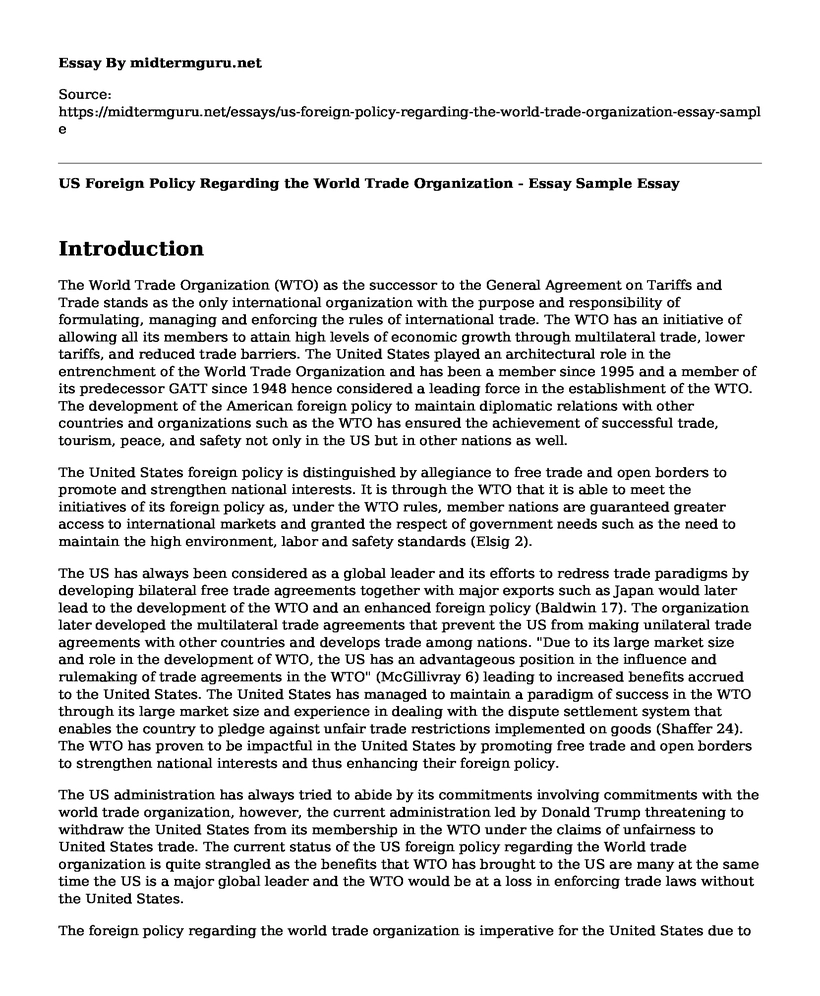Introduction
The World Trade Organization (WTO) as the successor to the General Agreement on Tariffs and Trade stands as the only international organization with the purpose and responsibility of formulating, managing and enforcing the rules of international trade. The WTO has an initiative of allowing all its members to attain high levels of economic growth through multilateral trade, lower tariffs, and reduced trade barriers. The United States played an architectural role in the entrenchment of the World Trade Organization and has been a member since 1995 and a member of its predecessor GATT since 1948 hence considered a leading force in the establishment of the WTO. The development of the American foreign policy to maintain diplomatic relations with other countries and organizations such as the WTO has ensured the achievement of successful trade, tourism, peace, and safety not only in the US but in other nations as well.
The United States foreign policy is distinguished by allegiance to free trade and open borders to promote and strengthen national interests. It is through the WTO that it is able to meet the initiatives of its foreign policy as, under the WTO rules, member nations are guaranteed greater access to international markets and granted the respect of government needs such as the need to maintain the high environment, labor and safety standards (Elsig 2).
The US has always been considered as a global leader and its efforts to redress trade paradigms by developing bilateral free trade agreements together with major exports such as Japan would later lead to the development of the WTO and an enhanced foreign policy (Baldwin 17). The organization later developed the multilateral trade agreements that prevent the US from making unilateral trade agreements with other countries and develops trade among nations. "Due to its large market size and role in the development of WTO, the US has an advantageous position in the influence and rulemaking of trade agreements in the WTO" (McGillivray 6) leading to increased benefits accrued to the United States. The United States has managed to maintain a paradigm of success in the WTO through its large market size and experience in dealing with the dispute settlement system that enables the country to pledge against unfair trade restrictions implemented on goods (Shaffer 24). The WTO has proven to be impactful in the United States by promoting free trade and open borders to strengthen national interests and thus enhancing their foreign policy.
The US administration has always tried to abide by its commitments involving commitments with the world trade organization, however, the current administration led by Donald Trump threatening to withdraw the United States from its membership in the WTO under the claims of unfairness to United States trade. The current status of the US foreign policy regarding the World trade organization is quite strangled as the benefits that WTO has brought to the US are many at the same time the US is a major global leader and the WTO would be at a loss in enforcing trade laws without the United States.
The foreign policy regarding the world trade organization is imperative for the United States due to the benefits accrued from membership in the organization. Benefits such as promoting US exports and jobs by lowering trade barriers, raising living standards of Americans by creating higher paying jobs through trade, resolving trade disputes and promoting democratic value enhance the economy of the United States. The creation of good trade agreements provide a country with benefits and boosts productivity and such are the benefits provided to the US by the WTO.
Works Cited
Baldwin, Richard. "The World Trade Organization and the Future of Multilateralism." Journal of Economic Perspectives 30.1 (2016): 95-116. pubs.aeaweb.org/doi/pdfplus/10.1257/jep.30.1.95. Accessed 17 June 2019
Elsig, Manfred. "The World Trade Organization at Work: Performance in a Member-Driven Milieu." The Review of International Organizations 5.3(2010):345-363.boris.unibe.ch/3627/8/11558_2010_Article_9093.pdf Accessed 17 June 2019
McGillivray, Fiona. "Democratizing the WTO." Essays in Public Policy 105 (2000). www.hoover.org/sites/default/files/uploads/documents/epp_105.pdf Accessed 17 June 2019
Shaffer, Gregory. "Chapter 7 Developing Country Use of the WTO Dispute Settlement System: Why it Matters, the Barriers Posed." Trade Disputes and the Dispute Settlement Understanding of the WTO: An Interdisciplinary Assessment. Emerald Group Publishing Limited, 2009. 167-190. www.ictsd.org/sites/default/files/research/2008/05/shaffer_1.pdf Accessed 17 June 2019
Cite this page
US Foreign Policy Regarding the World Trade Organization - Essay Sample. (2023, Jan 15). Retrieved from https://midtermguru.com/essays/us-foreign-policy-regarding-the-world-trade-organization-essay-sample
If you are the original author of this essay and no longer wish to have it published on the midtermguru.com website, please click below to request its removal:
- Paper Example on Samsung's Sustainable Competitive Advantage
- New Forms of Organization - Synthesis Essay
- Intern at Guards Polo Club: Managing Payrolls, Staff, Vendors & More - Essay Sample
- Business Ethics: Every Organization's Responsibility - Essay Sample
- Organizational Ethics: Key Considerations for Decision Making - Essay Sample
- Non-Profit Organizations: Goals & Objectives for Motivation - Essay Sample
- Australia Post: Delivering Quality Services Since 1809 - Essay Sample







